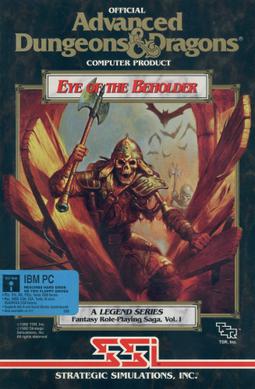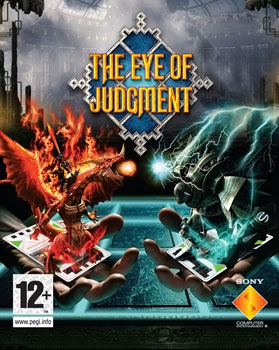
A memory card is an electronic data storage device used for storing digital information, typically using flash memory. These are commonly used in digital portable electronic devices. They allow adding memory to such devices using a card in a socket instead of a protruding USB flash drives.

Eye of the Beholder is a role-playing video game for personal computers and video game consoles developed by Westwood Associates. It was published by Strategic Simulations, Inc. in 1991, for the MS-DOS operating system and later ported to the Amiga, the Sega CD and the SNES. The Sega CD version features a soundtrack composed by Yuzo Koshiro and Motohiro Kawashima. A port to the Atari Lynx handheld was developed by NuFX in 1993, but was not released. In 2002, an adaptation of the same name was developed by Pronto Games for the Game Boy Advance.

The EyeToy is a color webcam for use with the PlayStation 2. Supported games use computer vision and gesture recognition to process images taken by the EyeToy. This allows players to interact with the games using motion, color detection, and also sound, through its built-in microphone. It was released in 2003.
Karaoke Revolution and its sequels are video games for the PlayStation 2, PlayStation 3, GameCube, Wii, Xbox, and Xbox 360, developed by Harmonix and Blitz Games and published by Konami in its Bemani line of music games. The original concept for the game was created by Scott Hawkins and Sneaky Rabbit Studios. Technology and concepts from the game were subsequently incorporated into Harmonix's game Rock Band.

Legend of the Five Rings is a fictional setting created by John Zinser, Dave Seay, Ryan Dancey, Dave Williams, DJ Trindle, Matt Wilson and John Wick and first published by a joint venture between Alderac Entertainment Group and ISOMEDIA in 1995. The setting primarily involves the fictional empire of Rokugan, though some additional areas and cultures have been discussed. Rokugan is based roughly on feudal Japan with influences from other East Asian cultures such as China, Mongolia and Korea. This setting is the basis for the Legend of the Five Rings Collectible Card Game as well as the Legend of the Five Rings Roleplaying Game. Legend of the Five Rings was also the "featured campaign setting" of the Oriental Adventures expansion to the third edition of Dungeons & Dragons, though this book is now out of print.
Several video games based on the Magic: The Gathering franchise exist for multiple systems. Some have attempted to translate the card game to electronic play nearly exactly; others have taken more liberties and drawn more from the setting than the actual rules of the card game. Benefits of successful video game versions of the card game include convenience, practice, and challenge. However, artificial intelligence for a game such as Magic is an extremely hard problem, and such software usually must be continuously updated to stay current with recently released card sets. Video game versions often expand on artwork, and may include unique cards that rely on randomness, effects which would be difficult or annoying to duplicate in real life.
The James Bond video game franchise is a series centering on Ian Fleming's fictional British MI6 agent, James Bond. Games of the series have been predominantly shooter games, with some games of other genres including role-playing and adventure games. Several games are based upon the James Bond films and developed and published by a variety of companies, The intellectual property is owned by Danjaq.

The PocketStation is a memory card peripheral by Sony Computer Entertainment for the PlayStation home video game console. Categorized by Sony as a combination of a Memory Card and a miniature personal digital assistant, the device features a monochrome liquid crystal display (LCD), infrared communication capability, a real-time clock, built-in flash memory, and sound capability. To use the device's memory card functionality, it must be connected to a PlayStation through a memory card slot. It was released exclusively in Japan on January 23, 1999.
Various accessories for the PlayStation 3 video game console have been produced by Sony and third-party companies. These include controllers, audio and video input devices like microphones, video cameras, and cables for better sound and picture quality.

The Eye of Judgment is a turn-based card battle video game for the PlayStation 3 platform, which utilizes the PlayStation Eye camera peripheral. It is the first game to use the peripheral, with which it was available in a bundle in Japan, Europe, the Middle East, and North America. Once planned for release close to the PlayStation 3 launch in November 2006, the game was eventually released on October 25, 2007 as Set 1 in Japan.

The PlayStation Eye is a digital camera device, similar to a webcam, for the PlayStation 3. The technology uses computer vision and gesture recognition to process images taken by the camera. This allows players to interact with games using motion and color detection as well as sound through its built-in microphone array. It is the successor to the EyeToy for the PlayStation 2, which was released in 2003.

The PlayStation 3 technical specifications describe the various components of the PlayStation 3 (PS3) video game console.

Dance Dance Revolution Extreme is a music video game by Konami and is the eighth release in the main Dance Dance Revolution (DDR) series. It was released on December 25, 2002 for Japanese arcades, on October 9, 2003 for the Japanese PlayStation 2, and on September 21, 2004 for the North American PlayStation 2. This game is the ninth release in North America, but despite having the same name as its Japanese counterpart, its gameplay and soundtrack is significantly different and won the Video Music Awards in 2005 on MTV for Best Video Game Soundtrack.
Elizabeth T. Danforth is an illustrator, editor, writer, and scenario designer for role-playing games and video games. She has worked in the game industry continuously since the mid 1970s.
The queen of spades is one of 52 playing cards in a standard deck: the queen of the suit of spades. In Old Maid and several games of the Hearts family, it serves as a single, powerful card in the deck.

Reality Fighters is a PlayStation Vita augmented reality video game developed by Novarama, and published by Sony Computer Entertainment.

Invizimals is an augmented reality video game franchise developed by Novarama and published by Sony Computer Entertainment Europe. The series, which originally began in 2009 as a video game on PSP, has since inspired toys, trading cards, comics and an animated television series telling an interconnected transmedia story.

A digital collectible card game (DCCG) or online collectible card game (OCCG) is a computer or video game that emulates collectible card games (CCG) and is typically played online or occasionally as a standalone video game. Many DCCGs are types of digital tabletop games and follow traditional card game-style rules, while some DCCGs use alternatives for cards and gameboards, such as icons, dice and avatars. Originally, DCCGs started out as replications of a CCG's physical counterpart, but many DCCGs have foregone a physical version and exclusively release as a video game, such as with Hearthstone.

Legends of Runeterra is a 2020 digital collectible card game developed and published by Riot Games. Inspired by the physical collectible card game Magic: The Gathering, the developers sought to create a game within the same genre that significantly lowered the barrier to entry. Since its release in April 2020, the game has been free-to-play, and is monetised through purchasable cosmetics. The game is available for Microsoft Windows and mobile operating systems iOS and Android.

Magic: Legends was an action role-playing video game based on the Magic: The Gathering collectible card game. It was developed by Cryptic Studios and published by Perfect World Entertainment. The game began an open beta for Microsoft Windows in March 2021, with plans for open release later that year as a free-to-play title on Windows, PlayStation 4, and Xbox One. On June 29, 2021, it was announced that development would cease. The servers were shut down on October 31, 2021.














